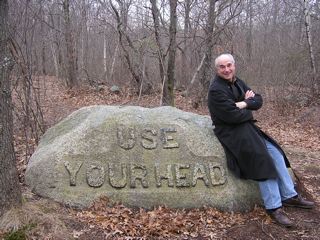 In his 1905 book, The Protestant Ethic and the Spirit of Capitalism, German economist and sociologist Max Weber theorized that capitalism’s ascendancy owed much to Protestantism’s emphasis on hard work and worldly success. Whether or not Weber was actually right, the term he coined, “Protestant ethic,” has, to many, become accepted as part of our shared American definition.
In his 1905 book, The Protestant Ethic and the Spirit of Capitalism, German economist and sociologist Max Weber theorized that capitalism’s ascendancy owed much to Protestantism’s emphasis on hard work and worldly success. Whether or not Weber was actually right, the term he coined, “Protestant ethic,” has, to many, become accepted as part of our shared American definition.
Category: History
Darwin and Lincoln: 200 Years Today (or are they?)

 Born 200 years ago, February 12, 1809: Charles Darwin, who changed the way we think about a human’s place in the bios, and Abraham Lincoln, who changed the way we think about a human’s place in society.
Born 200 years ago, February 12, 1809: Charles Darwin, who changed the way we think about a human’s place in the bios, and Abraham Lincoln, who changed the way we think about a human’s place in society.
–
* * *
But perhaps these two Great Men were not born on the same day. Darwin’s birth was in a time zone five hours later than Lincoln’s. If “date of birth” is defined by calendar, then the two men were born on the same calendar day. But if Baby Abe was born later than 7 p.m. in that little log cabin near what is now Hodgenville, Kentucky, then it was already February 13 where Baby Darwin lay in Shrewsbury, England. Similarly, if Infant Charles took Breath One earlier than 5 a.m., then it was still February 11 in Kentucky. Accordingly, to be safe, I am posting this a day early.
Lincoln’s Contested Legacy
Scores of articles have been written to commemorate the 200th anniversary of Lincoln’s birth. One of the most interesting appeared in the February 2009 issue of Smithsonian magazine. I reprint it here in its entirety. The images and links are my choices.
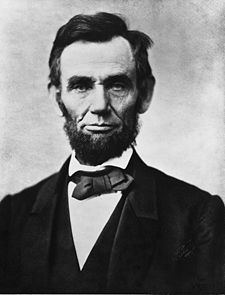 Lincoln’s Contested Legacy
Lincoln’s Contested Legacy
Great Emancipator or unreconstructed racist? Defender of civil liberties or subverter of the Constitution? Each generation evokes a different Lincoln. But who was he?
From the time of his death in 1865 to the 200th anniversary of his birth, February 12, 2009, there has never been a decade in which Abraham Lincoln‘s influence has not been felt. Yet it has not been a smooth, unfolding history, but a jagged narrative filled with contention and revisionism. Lincoln’s legacy has shifted again and again as different groups have interpreted Continue reading “Lincoln’s Contested Legacy”
Lincoln Head Cents: 1909-2009 and Beyond…
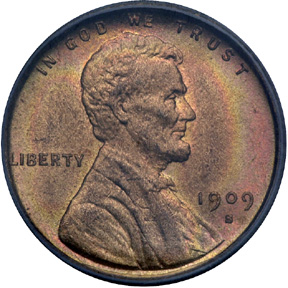 These days Americans accept and expect famous faces on our coins: Washington quarters (first minted in 1932), Jefferson nickels (1938), Roosevelt dimes (1946), Franklin (1948) and Kennedy (1964) half-dollars, Eisenhower (1971), Susan B. Anthony (1979), and Sacagawea (2000) dollars. But from first United States coinage in 1793 until 1909, no coin had the image of a real person on it. In 1909, however, Pres. Theodore Roosevelt wished to commemorate the 100th anniversary of Abraham Lincoln’s birth by putting Honest Abe’s face on a coin.
These days Americans accept and expect famous faces on our coins: Washington quarters (first minted in 1932), Jefferson nickels (1938), Roosevelt dimes (1946), Franklin (1948) and Kennedy (1964) half-dollars, Eisenhower (1971), Susan B. Anthony (1979), and Sacagawea (2000) dollars. But from first United States coinage in 1793 until 1909, no coin had the image of a real person on it. In 1909, however, Pres. Theodore Roosevelt wished to commemorate the 100th anniversary of Abraham Lincoln’s birth by putting Honest Abe’s face on a coin.
In spite of Lincoln’s popularity, however, not all were in favor of his image on a coin. In addition to setting a “monarchical” precedent (originally kiboshed by George Washington), some were opposed for less worthy reasons:
Continue reading “Lincoln Head Cents: 1909-2009 and Beyond…”
Un-Racism: You Have to Be Carefully Taught
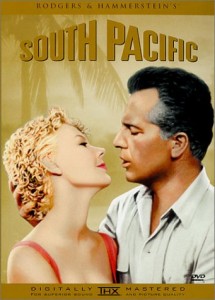 James Michener‘s short story collection, Tales of the South Pacific, a bestselling Pulitzer Prize winner in 1948, was eclipsed a year later by South Pacific, the blockbuster Richard Rodgers–Oscar Hammerstein musical that includes some of the most memorable songs written for the stage. One song, “You’ve Got To Be Carefully Taught,” includes this verse:
James Michener‘s short story collection, Tales of the South Pacific, a bestselling Pulitzer Prize winner in 1948, was eclipsed a year later by South Pacific, the blockbuster Richard Rodgers–Oscar Hammerstein musical that includes some of the most memorable songs written for the stage. One song, “You’ve Got To Be Carefully Taught,” includes this verse:
You’ve got to be taught to be afraid
Of people whose eyes are oddly made
And people whose skin is a different shade
You’ve got to be carefully taught
The converse is also true: you have to be carefully taught to be color-blind. Witness this exchange between one of my daughters and her almost-four-year-old son:
Continue reading “Un-Racism: You Have to Be Carefully Taught”
MLK’s “I Have a Dream” Speech
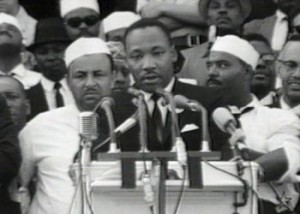 On August 28, 1963, Dr. Martin Luther King, Jr., gave a speech in Washington, DC, to an immense crowd that filled the Capitol Mall. Revered and reviled in his time, King stood as the standard bearer in the fight for civil rights.
On August 28, 1963, Dr. Martin Luther King, Jr., gave a speech in Washington, DC, to an immense crowd that filled the Capitol Mall. Revered and reviled in his time, King stood as the standard bearer in the fight for civil rights.
Clarence Jones, King confidante and one of those who helped draft the scripted part of the speech, recalled on CNN today that halfway through the speech, King turned his prepared speech face down and began to dream aloud and extemporaneously. Jones recalled how the uplifting oratory of that dream prompted one of those near to King to whisper that these people [on the Mall] “are going to go to church now.”
Almost a half-century later, on Martin Luther King Day, one day before Barack Obama will be sworn in as our president, it is time to “go to church” again, to watch and listen to King’s momentous…and now prophetic…speech.
(Link to the full transcript.)
[youtube PbUtL_0vAJk]

